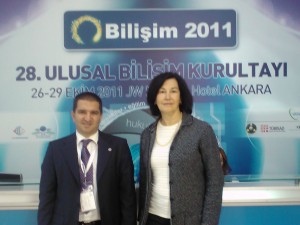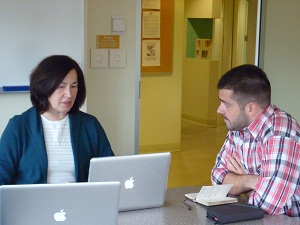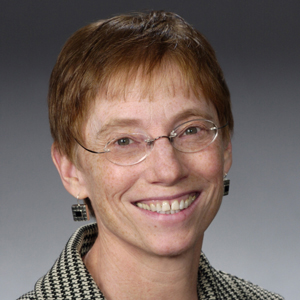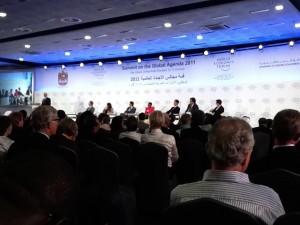Erdem Erkul, a former NCDG Fellow, and lead for Citizen Engagement for Microsoft Turkey, was a key organizer of the 40th Anniversary Conference of the Informatics Association of Turkey. The conference drew hundreds of researchers, activists, government officials and business leaders from throughout Turkey. Jane Fountain gave the international keynote address focusing on the potential and challenges for social activism in the digital age.
Centro de Estudos Internacionais sobre Governo (CEGOV)
 NCDG engaged in a virtual conference with researchers and leaders at Centro de Estudos Internacionais sobre Governo (CEGOV) on November 21. CEGOV researchers work on multidisciplinary projects in the areas of international politics and governance, monitoring and evaluating public policies, institutional development and the capacity for governance in Brazilian and South American models as well as co mparing institutional decision-making in management, decentralization and democratic control of public service. Diego Canabarro, a lawyer and specialist in international relations, visited NCDG during November to meet with researchers on a variety of Internet policy challenges facing Brazil and the Global South.
NCDG engaged in a virtual conference with researchers and leaders at Centro de Estudos Internacionais sobre Governo (CEGOV) on November 21. CEGOV researchers work on multidisciplinary projects in the areas of international politics and governance, monitoring and evaluating public policies, institutional development and the capacity for governance in Brazilian and South American models as well as co mparing institutional decision-making in management, decentralization and democratic control of public service. Diego Canabarro, a lawyer and specialist in international relations, visited NCDG during November to meet with researchers on a variety of Internet policy challenges facing Brazil and the Global South.
Aufderheide kicks off Open Access Week
 To kick off Open Access Week (October 24-28), a series of events about open educational resources, open access journals, open data, copyrights and authors rights, keynote speaker Patricia Aufderheide gave a talk, Beyond the Copyright Wars: Fair Use, Free Speech, and Reframing the Policy Debate, on Monday October 24.
To kick off Open Access Week (October 24-28), a series of events about open educational resources, open access journals, open data, copyrights and authors rights, keynote speaker Patricia Aufderheide gave a talk, Beyond the Copyright Wars: Fair Use, Free Speech, and Reframing the Policy Debate, on Monday October 24.
Conor White-Sullivan sells Localocracy to Huff Post Media Group
Conor White-Sullivan, NCDG undergraduate fellow 2009-2010, co-founded Localocracy in 2008 wit h fellow student, Aaron Soules, CTO, to engage citizens, elected officials and journalists in local issues on a transparent and public platform. Wanting to build on their approach to enhancing democracy online, AOL’s Huffington Post Media Group purchased Localocracy on October 3rd. Along with two of his co-founders, Conor White-Sullivan, 23, will join Huffington Post Media Group and continue to expand their work. Read More in The Boston Globe, Mass High Tech, and Bloomberg.
h fellow student, Aaron Soules, CTO, to engage citizens, elected officials and journalists in local issues on a transparent and public platform. Wanting to build on their approach to enhancing democracy online, AOL’s Huffington Post Media Group purchased Localocracy on October 3rd. Along with two of his co-founders, Conor White-Sullivan, 23, will join Huffington Post Media Group and continue to expand their work. Read More in The Boston Globe, Mass High Tech, and Bloomberg.
World Economic Forum Future of Government report
Digital governance is one of the five key themes for the annual meeting of the World Economic Forum at Davos this year. In Abu Dhabi, at the WEF Global Agenda Council Summit, interest in digital governance from several Global Agenda Councils was intense. This year, Jane Fountain is the Vice Chair of the Global Agenda Council on the Future of Government. She chaired the Council last year and, with Council members, launched the report, “The Future of Government: Lessons Learned from around the World” at the WEF Europe and Central Asia Summit held in Vienna in June 2011 .
.
The Internet and Islam – The Digital Origins of Dictatorship and Democracy
 Philip Howard, Associate Professor of Communication at the University of Washington has just published The Internet and Islam – The Digital Origins of Dictatorship and Democracy. The book investigates the impact of digital technologies on civic life in countries with significant Muslim communities. According to Howard, “The book uses innovative comparative methods to look at how technologies like the mobile phone and internet have changed the very meaning of citizenship…[O]n the whole the prognosis is good: in the last 15 years, technology diffusion trends have contributed to clear political outcomes, and digital media have become a key ingredient in the modern recipe for democratization.” Read more from the publisher.
Philip Howard, Associate Professor of Communication at the University of Washington has just published The Internet and Islam – The Digital Origins of Dictatorship and Democracy. The book investigates the impact of digital technologies on civic life in countries with significant Muslim communities. According to Howard, “The book uses innovative comparative methods to look at how technologies like the mobile phone and internet have changed the very meaning of citizenship…[O]n the whole the prognosis is good: in the last 15 years, technology diffusion trends have contributed to clear political outcomes, and digital media have become a key ingredient in the modern recipe for democratization.” Read more from the publisher.
NCDG Research Presented at DCRLAS-RCC Symposium July 26
Jane Fountain will present some of her research on the Office for Harmonization in the Internal Market as a case study at the DCRLAS-RCC International Academic Program on Monday, July 26 from 9:00 am to 12:00 pm at Harvard’s Auditorium of the Maxwell Dworkin Building. More information about the Program is available at the RCC website.
Oyedemi Received NCDG Grant and Fellowship
 Toks Oyedemi, a doctoral candidate in the Department of Communication at the University of Massachusetts Amherst, has received a 2010 Student Research Grant from the National Center for Digital Government (NCDG).The award will help Oyedemi conduct doctoral field research on the pattern and quality of Internet access and the role of technology in social change in South Africa.
Toks Oyedemi, a doctoral candidate in the Department of Communication at the University of Massachusetts Amherst, has received a 2010 Student Research Grant from the National Center for Digital Government (NCDG).The award will help Oyedemi conduct doctoral field research on the pattern and quality of Internet access and the role of technology in social change in South Africa.
In addition to receiving the research grant, Oyedemi joins the Center as a Research Fellow for the 2010-2011 academic year. As a fellow, Oyedemi joins a team of international NCDG scholars exploring the impact of technology on local, state and federal governments around the world.
Funded by the National Science Foundation, the NCDG seeks to build global research capacity, to advance practice, and to strengthen the network of researchers and practitioners engaged in building and using technology in government. NCDG Student Research Grants are designed to support student research programs at UMass Amherst that examine the intersection of information and communication technologies, policy, and government. More information about NCDG is available at www.ncdg.org.
Schweik, et al Create iPhone App to Save Oiled Wildlife
 Starting today, iPhone users who come upon oiled birds and other wildlife in the Gulf Coast region can immediately transmit the location and a photo to animal rescue networks using a free new iPhone app, MoGO, for Mobile Gulf Observatory. It was developed by four University of Massachusetts Amherst researchers to make it easier for the public to help save wildlife exposed to the oil spill in the Gulf of Mexico.
Starting today, iPhone users who come upon oiled birds and other wildlife in the Gulf Coast region can immediately transmit the location and a photo to animal rescue networks using a free new iPhone app, MoGO, for Mobile Gulf Observatory. It was developed by four University of Massachusetts Amherst researchers to make it easier for the public to help save wildlife exposed to the oil spill in the Gulf of Mexico.
The UMass Amherst researchers hope the MoGO app will draw on the large network of “citizen scientists” who are as heartbroken as they are to witness the disaster for marine life and who are actively looking for ways to help save wildlife along the 14,000 miles of northern Gulf coastline.
Although rescue networks are in place and busy saving stranded wildlife, the task is enormous and trained staff too few. They just don’t have the people-power to cover all the territory from Louisiana to Florida. With over 400 wildlife species and 35 national wildlife refuges at risk, the Gulf is in crisis from the largest oil spill in U.S. history.
“That’s where citizen science comes in,” says UMass Amherst wildlife biologist Curt Griffin. As he explains, “The new app allows anyone who finds an oiled animal to be linked automatically by the phone to the Wildlife Hotline and also to contribute photos of the stranded animal and its GPS location coordinates to a database here on campus.”
Each report will alert wildlife stranding networks to deploy experts to rescue live animals for clean-up and medical treatment. Photos of oiled wildlife plus the GPS location will also be uploaded to MoGO’s comprehensive database for review by wildlife and fisheries experts using a Web browser. Users are also encouraged to upload their photos of dead marine and coastal wildlife, tar balls on beaches, oil slicks on water and oiled coastal habitats to the MoGO database.
The idea for the new app came to Charlie Schweik, associate director of the National Center for Digital Government, as he listened to yet another depressing story about the Gulf oil spill. Already working on invasive species mapping with computer scientist Deepak Ganesan, an expert in mobile phone and sensor systems, Schweik thought that experience might prove useful for inventorying damage in the Gulf. Smartphones such as the iPhone have several sensors including camera, GPS, audio and video, which can provide valuable data for such an application.
Schweik also turned to Griffin and Andy Danylchuk, a fisheries ecologist, his colleagues in UMass Amherst’s natural resources conservation department, to connect to the wildlife and fisheries community. Griffin and Danylchuk agreed that a mobile phone app in the hands of an army of “citizen scientists” would enhance recovery efforts by wildlife stranding networks. It could also increase the efficiency of state and federal efforts to monitor, assess and respond to the damage caused by the spill and engage the public to partner with natural resources agencies and researchers.
As Danylchuk points out, “The MoGO public database will help guide restoration efforts of vital coastal and marine habitats, and be used by scientists world-wide to assess the ecological impacts of the spill on the Gulf. The public database also allows scientists outside the Gulf region to participate in the assessment.”
The app takes advantage of “mobile crowdsourcing,” that is, the power of smart personal mobile devices to provide thousands of eyes and ears on the ground. Ganesan’s research group has designed a software framework called “mCrowd,” which simplifies the usual weeks- to months-long process of developing a new mobile crowdsourcing app. “It provides easy-to-use templates that can be tailored to a new application,” Ganesan explains. His mCrowd technology allowed the UMass Amherst team to create the MoGO app and infrastructure in a little more than a week.
Whether the project succeeds now rests on how well the word gets out to the public in the Gulf region, the researchers note. “Any person, on land or at sea, wishing to use the free app for their iPhone can go to www.savegulfwildlife.org for more information on how to get it on their iPhone,” Schweik says.
Erkul elected to European Commission Informatics Portal
 R. Erdem Erkul, 2008-2009 NCDG Doctoral Fellow, was elected to the European Commission Informatics Portal Informal Expert Committee on epractice.eu. Epractice.eu is a European Commission egovernment portal for the professional community of eGovernment, eInclusion and eHealth practitioners.
R. Erdem Erkul, 2008-2009 NCDG Doctoral Fellow, was elected to the European Commission Informatics Portal Informal Expert Committee on epractice.eu. Epractice.eu is a European Commission egovernment portal for the professional community of eGovernment, eInclusion and eHealth practitioners.